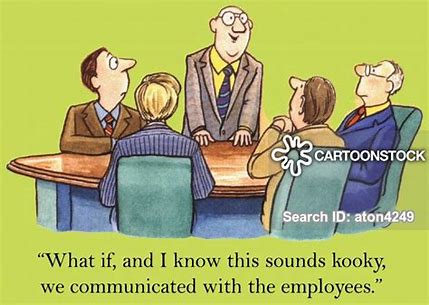Article-Detail

Management of Employee Rights Is Part of Leadership
Today, let’s go back in history for a minute to shed light on a recurring problem in Labor-Management interactions that end up costing organizations a lot of money, costing people their jobs, and brings public humiliation for way too many. Employees have rights whether they are represented by a formal union or not, and even if management feels as if the employee is caught “red handed”. Part of management is protecting these rights. In two particular cases, good labor practices were not followed, and as a result cases were taken to the highest court and rules were established for us to follow. Further, the events suggest that people weren’t even listened to, which brings its own problems. Let’s get into it.
Leura Collins worked at J. Weingarten’s grocery store #2, she sold hot food sold at a counter from 1961 until 1970 when she was transferred to store #98 which had a lobby with an eating area. J. Weingarten had a company policy that said employees could eat free at stores with a counter but could not eat free at stores with a lobby. One day, Collins was accused by another employee of stealing from her register. Weingarten management sent a company investigator to watch her and report what was observed without the knowledge of the store manager. The Investigator found no wrongdoing. The manager told the investigator that another employee reported that Collins failed to pay full price for a box of chicken she had for lunch. The manager and investigator called Collins in for an interview. Collins quickly asked for a union representative, several times, her requests were refused by the manager. She explained that since the store ran out of the $1 boxes, she used the next size box for her lunch, and that she paid for her lunch. The investigator asked the employee who reported the theft, that employee said that she didn’t know how much chicken was put in the box. The investigator apologized to Collins and prepared to let her go.
Collins began crying and said that the only thing she had ever gotten from the store without paying for was a free lunch which sparked a new investigation on the spot. She explained her confusion about the two policies upon her transfer and asked for union representation again. Her request was again denied. Collins was offered a settlement declaring that she owed the store $160, she refused to sign it. It turns out that due to the confusing policy, most if not all employees had taken free lunches. Despite that, Collins was terminated and management asked Collins to keep the inquiry private. She spoke to her union steward and an unfair labor practice suit was filed. The courts ruled in Collins’ favor, J. Weingarten appealed all the way to the US Supreme Court in a failed attempt to maintain management’s power. In 1975, the US Supreme Court decided and established what we now call employee’s Weingarten Rights. Weingarten rights recognizes that employees have a right to union representation in any meeting that they reasonably feel could result in discipline. Here are the two simple rules:
1. The employee must make a clear request for union representation either before or during the interview. That employee cannot be punished for making this request.
2. After the employee makes the request, the employer must grant the request and delay the interview until representation is available. The employee also has the right to a private conversation with their representative prior to the inquiry
An unknown fact about Weingarten rights is that you are entitled to them even if you are not represented by a union, you just have to ask and management must allow you time to secure representation. Failure to follow this simple procedure violates an employee’s Weingarten rights and constitutes an unfair labor practice. An employee found in this circumstance can refuse to answer any questions without penalty. Good managers inform employees up front of their options and allow the employee to choose.
On July 11, 1972, John F. Skelly was called into the Personnel Office of the California Department of Health Care Services. He served as a medical consultant there for seven years, however, as of 5pm that day his tenure with the state would end. He was 64 years old with deteriorating eye sight and a speech impediment that made him difficult to understand. It didn’t help that he was a day drinker, he smelled as if he had been drinking that day. Skelly was handed a written notice by Personnel Officer, Wade Williams, that listed three causes for his dismissal: 1. Intemperance, 2. Inexcusable absence without leave, and (3) other failure of good behavior during duty hours which caused discredit to the Department. Further, that notice informed him that to secure a hearing in the matter, he would be required to file a written response with the Board within 20 days, otherwise this punitive act would be final.
His discipline documentation dated back to November 17, 1970 and included three successive supervisors. His reprimands began with Skelly extending his lunch period from the usual 45 minutes to an hour without permission or notice. He received a written reprimand on February 28, 1972 and a one day unpaid suspension. That didn’t do much to correct the behavior. His supervisor, Gerald Green, met with him on March 3, 1972 to discuss his continued excessive lunch periods. Green documented lengthy lunch breaks on March 13, 14, 15, and 16. Green met with Mr. Skelly again on March 16 in an attempt to resolve the issue. When asked, Mr. Skelly said he was sick, Green responded by saying he had observed Skelly drinking at a bar (which he had) that day. Green informed Skelly that further violations would result in disciplinary action and even dismissal.
June 26, Bernard Moore, Skelly’s new supervisor called Skelly to his office. Skelly did not show. Moore found him laughing and talking at a bar with a drink in front of him and his arm around a companion. Skelly left the bar and did not return to work. When asked, the following day, Skelly claimed to be sick. He says he went to the bar to wait on his wife to pick him up and, despite his illness, he had two drinks.
Skelly argued his termination and the process employed by management to no avail, he was terminated. He appealed his termination and fought the state of California all the way to the US Supreme Court. In 1975 the court ruled and established what are called your right to Skelly which ensures that you have the right to an appeal hearing prior to it going into effect.
In my experience as a leader and coach, both employees and management have run into problems because of their lack of familiarity with Weingarten and Skelly rights. Both were established in 1975, neither are revisited enough to prevent persistent problems at work. Employees, even those who are not represented, have a right to representation and an opportunity to appeal management disciplinary decisions. Management need not see these rights as a threat, instead as an opportunity to ensure that employee rights are protected and process has been carried out properly. Yes, they will challenge your investigation and conclusions, use this as an opportunity to strengthen your skills as a leader. The first step is having a positive relationship with employees and the unions who represent them. Lastly, constant communication will eliminate unmet expectations and the opportunity to resolve issues prior to them becoming big, expensive, and public problems for the organization. Leura Collins should have been listened to, John Skelly should have been fired. The problem with both incidents was managers overstepping their authority and trampling employee rights. Establish good relationships, communicate, and protect employee rights and you will SOAR!
William A. Brown
August 25, 2019
Weingarten rights
https://en.wikipedia.org/wiki/NLRB_v._J._Weingarten,_Inc.
Skelly rights
https://law.justia.com/cases/california/supreme-court/3d/15/194.html





Comments : cialis 20 mg side effects https://newfasttadalafil.com/ - Cialis Mfqzei cialis without a prescription https://newfasttadalafil.com/ - buying cialis online safely Tadacip In The Us
06-05-2022